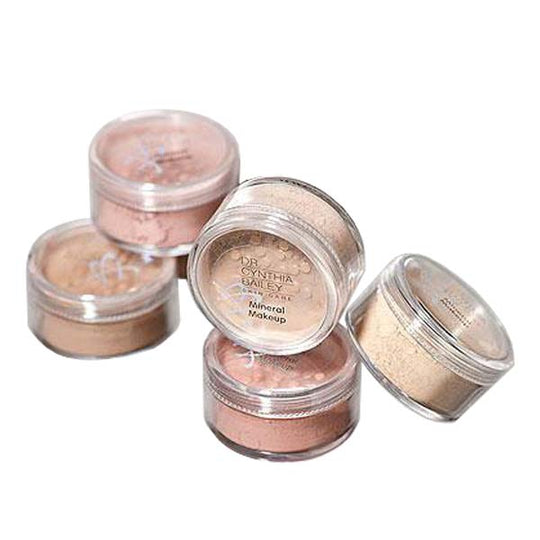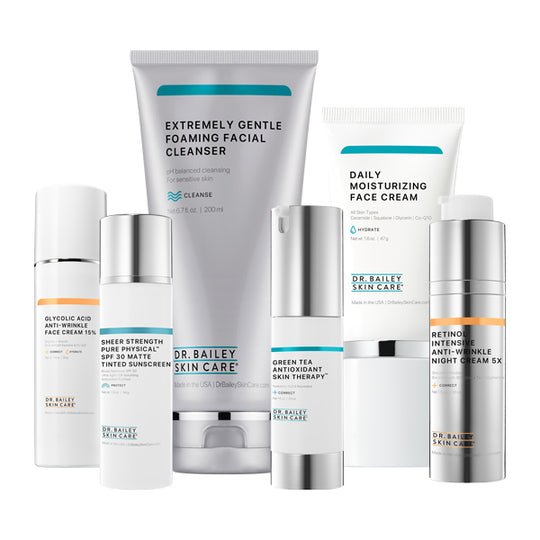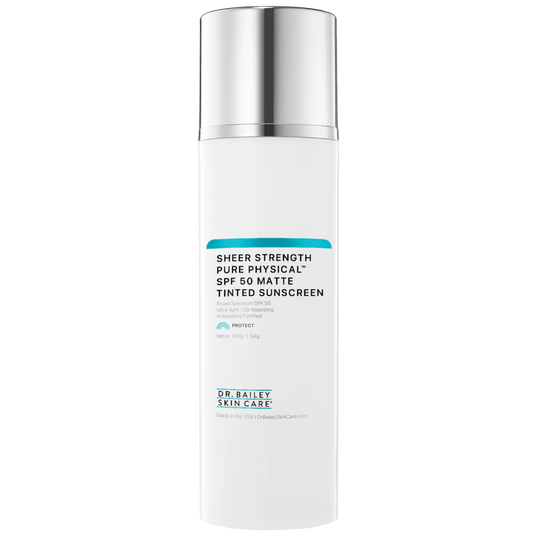Makeup Tips & Healthy Skin Care Best Practices

Have you heard conflicting makeup and skin care tips from “experts” on when and how you should apply your makeup and sunscreen, what the best makeup and sunscreens are for your skin type (think sensitive skin, acne-prone, mature, post menopausal etc)? Do you wonder if sharing makeup and the makeup testers at makeup counters put you at risk for herpes and other skin infections? And, old makeup and sunscreen - do these products last forever and how about all the old products in your bathroom cabinet - should you really use them?
These are really practical makeup and skin health questions that I’ve been asked for years as a dermatologist. I’ve got simple answers based on clinical experience, scientific training, and developing best practices for my own personal skin care routine.
Here are my tips to help you take really good care of your own complexion with confidence. In this article we will cover:
- Should Sunscreen or Makeup Be Applied First?
- How Long is Sunscreen Safe to Use?
- Sharing Makeup and Lip Products
- Why Mineral Makeup is the Best for Your Skin
- Mineral Makeup for Sun Protection?
- Skin Care and Old Makeup
- Makeup Tips for Aging Skin
- Post Menopausal Skin and Makeup
- Makeup and Acne Prone Skin
- Sleeping in Makeup and Its Effects on Skin Health
Should Sunscreen or Makeup Be Applied First?
When it comes to your morning skin care routine, there is a lot of debate about whether sunscreen or makeup should go on first. As a dermatologist, I get asked about this skincare dilemma frequently.
The secret lies in the order. Prioritizing sunscreen as a key step in your routine is crucial. By doing so, you establish a robust defense against the sun's harmful UV rays, effectively safeguarding your skin from premature aging, sunburn, and the potential risk of skin cancer. Apply a broad-spectrum sunscreen to exposed facial skin before you apply makeup.
But that's not all—selecting the perfect makeup that seamlessly complements your sun protection will help enhance both the health and appearance of your skin. Not all sunscreens are created equal, and some may not layer well with makeup. Others may actually enhance your makeup by acting like a primer. The compatibility of your sunscreen and makeup can really enhance your results!
For example, choosing a matte finish sunscreen will help to prevent your makeup from sliding or caking and may even help absorb oil during the day. I recommend using mineral makeup that contains natural ingredients layered over a matte SPF. This combo gives excellent makeup results and also offers additional UV ray protection that can be safely applied over sunscreen.
To get the best possible protection from the sun, while also looking your best read my article about the best practices for applying sunscreen before or after makeup. In it, I go into detail about how to select the best sunscreen, what ingredients matter, SPF in makeup, what products I’m using as an experienced dermatologist, and I even have a video on proper product layering.
Sheer Strength Pure Physical Tinted Sunscreen is your perfect makeup primer when applied under your makeup.
How Long is Sunscreen Safe to Use?
Sunscreen will lose its potency over time, leaving your skin vulnerable to harmful UV rays. Using expired sunscreen not only compromises its sun protection capabilities but also accentuates skin pigment problems and increases the risk of sunburn, premature aging, and even skin cancer.
Not all types of sunscreen are the same:
- Chemical sunscreens absorb into the skin and chemically neutralize UV rays; however, they break down faster and can be irritating to some people's skin and eyes.
- Mineral sunscreens sit on top of the skin and work by reflecting and absorbing UV rays. Some products are thicker but many modern mineral sunscreens are thin and weightless. Importantly, they are less likely to irritate sensitive skin and eyes. Mineral sunscreens are also more stable than chemical sunscreens, so they are less likely to break down in the sun and over time in the container.
- Hybrid sunscreens combine chemical and mineral sunscreens. They may allow for a light and weightless texture while providing broad-spectrum protection. My preference is the hybrid SPF combination of zinc oxide and octinoxate active ingredients.
To learn more about sunscreen, how to tell if it’s expired, what to look for when choosing the right sunscreen for your skin, read my article Does Sunscreen Expire? I also share what sunscreens I use to protect my own family.
The best sun protection is to use sun hats and the best products. Check out my current collection of zinc oxide sun protection products which provide the most advanced broad spectrum, are hypoallergenic, and weightless.
Sharing Makeup and Lip Products
Concerned about the risk of contracting herpes from sharing makeup or lip products? As a dermatologist, I'm here to provide clarity and essential tips for a healthy skincare routine.
Firstly, let's address the burning question: Can you get herpes from sharing makeup, chapstick, or lipstick? The answer is both yes and no. While it's highly unlikely to contract the herpes virus from using shared makeup, it's not entirely impossible. However, it's crucial to exercise caution and prioritize hygiene to minimize any potential risks.
In my article, Can you get herpes from sharing makeup, chapstick or lipstick I delve deeper into the details, discuss how herpes skin infection can spread, how long the virus lives in lip products, and share best practices to maintain your lip and skin health.
Why Mineral Makeup is the Best for Your Skin
If you're seeking the best practices to enhance your natural beauty, I highly recommend learning more about mineral makeup.
Mineral makeup is my top recommendation when it comes to achieving a flawless complexion without compromising your skin health. Made from natural minerals derived from the earth, pure mineral makeup is free from harmful ingredients that can irritate your skin or clog your pores.
This means that while you're effortlessly enhancing your appearance, you're not adding allergens, irritants or other ingredients that may cause rashes or acne. Besides being hypoallergenic, it has anti-aging benefits as it protects your skin from the harmful effects of the sun's UV rays (see more on this in the next section). My mineral makeup products are made from the finest triple milled pure mineral powders.
Here are some of the top benefits of pure mineral makeup:
- It's non-comedogenic, so it won't clog your pores.
- It's often hypoallergenic, so it's less likely to cause an allergic reaction.
- It can augment your broad-spectrum sun protection.
- It's lightweight and feels natural on the skin.
- It's buildable, so you can customize the coverage to your liking.
Learn more about why you should incorporate it into your beauty regimen in my article about the benefits of mineral makeup.
Mineral Makeup for Sun Protection?
As a dermatologist, one of the questions I get is whether or not mineral makeup can actually protect your skin from the sun. The answer lies in understanding the key ingredients and their effectiveness.
While mineral makeup can offer some level of sun protection, it's important to note that it may not provide sufficient coverage on its own. Mineral makeup powders are made from mineral particles that scatter UV rays, which helps to prevent them from penetrating the skin. In fact, the same minerals that are used to create mineral sunscreens (zinc oxide and titanium dioxide), are sometimes present in mineral makeup products. There are some very brilliant uses of the Earth’s minerals in skin care! Learn more about why I think zinc oxide sunscreens are better and why I recommend pure mineral makeup powder.
To ensure comprehensive sun protection, I recommend applying a sufficient layer of broad-spectrum mineral zinc oxide sunscreen and then layering your mineral makeup on top. This combination acts as a powerful defense against UV damage, reducing the risk of premature aging, sunburn, skin pigment problems and many other potential skin concerns.
 Pure Loose Mineral Makeup Powder Foundation will give you complete long-lasting coverage and sun protection.
Pure Loose Mineral Makeup Powder Foundation will give you complete long-lasting coverage and sun protection.
Pure mineral makeup also has other benefits for your skin. It's often free of irritating ingredients like talc and chemical dyes, making it a good choice for people with sensitive skin. It can also help to mattify your skin, reduce oily shine and the appearance of pores.
To explore the full details and gain expert insights on the role of mineral makeup in your skincare routine, please read my full article where I delve into mineral makeup sunscreen, foundation, and sun protection. These tips and best practices will help you make informed decisions for healthy, radiant skin while ensuring optimal sun protection and overall skincare benefits.
Skin Care and Old Makeup
We all love our favorite makeup products, but did you know that expired cosmetics can pose serious risks to your skin’s health? I'm asked again and again how often you should throw away your makeup. The answer depends on the product, but in general, most cosmetics have a maximum shelf life of 2-3 years and some even much less!
Expired makeup can harbor bacteria that can lead to skin infections, breakouts, skin irritations, or even eye infections. I encourage my patients and readers to adopt best practices like cleansing makeup brushes and tools regularly, as these can accumulate bacteria, become soiled with oil and product residue and ultimately compromise your skin's health and the results of your makeup application. By embracing simple yet effective tips, you can ensure that your makeup routine not only enhances your beauty but also preserves your skin's vitality.
One of my top recommendations is to pay special attention to liquid-based products like foundations, concealers, and mascaras which can particularly welcome harmful bacteria over time. To stay on the safe side, it's crucial to replace these items every six months.
I go into details about all this, what signs to look out for that your makeup has gone bad, and when to bid farewell to old makeup and cosmetics, in my guide about if and when you really need to throw out old makeup.
Makeup Tips for Aging Skin
We all know that as the years go by, our skin undergoes changes. For example, the production of collagen and elastin slows down, which can lead to wrinkles and sagging. Skin thins, dries out and age spots appear. This can make choosing the right makeup that looks natural and flattering a bit tricky.
I've got you covered with some best practices to keep your skin healthy and glowing while enhancing your natural beauty at any age. Some essential recommendations to help revamp your makeup routine and take care of your aging skin simultaneously include:
- Cleanse well but avoid over cleansing that can dry out your skin
- Invest in a high-quality moisturizer and broad-spectrum SPF
- Embrace a minimalist approach to the skin care products that you use to avoid aggravating skin problems
- Use a light-reflecting primer, or mineral sunscreen that acts like a primer, under makeup during the day
- Blend your makeup well and apply it with clean brushes and tools
Trust me, with the right technique and a few strategically chosen products, you can nurture your skin and achieve a luminous and youthful glow.
You can learn more in my article about makeup tips for aging skin and how to put on makeup. Based on my expertise as a dermatologist, I explain how to create a natural, fresh-faced look that highlights your best features, without accentuating those you want to minimize, and while prioritizing the health of your skin.
Post Menopausal Skin and Makeup
Let’s talk about skin care and choosing the right makeup for post-menopausal skin. After menopause our skin dramatically changes. It becomes thinner, drier, and more prone to wrinkles. This can make it difficult to find makeup that looks natural and doesn't accentuate these changes.
Read my guide about the best post menopausal skin care where I go into detail about the changes your skin goes through after menopause, my anti-aging skin care after menopause, a proven skin care routine to slow skin thinning, and what products I, as a dermatologist, use.

Ageless Rejuvenation Skin Care Kit has essential skin care ingredients to fight menopausal, perimenopausal and pre-perimenopausal skin changes.
Moisturizing is a key step in your daily skincare routine to prevent dryness, but did you know that it's equally important when it comes to your makeup? It’s hard to apply makeup on flaky skin so using gentle exfoliating cleansers and a high quality moisturizer are key first steps for your makeup routine.
I highly recommend pure mineral makeup foundation powders for post menopausal skin as they are free from artificial dyes, fragrance and fillers that can aggravate skin problems such as rosacea. Really good mineral makeups are less likely to crease and cake or migrate into wrinkles during the day. They provide excellent coverage, will not clog your pores, and give your complexion a radiant, youthful glow. Plus the minerals can provide extra sun protection when applied over your daily sunscreen.
In this article, I share my expertise and tips on how to choose the best makeup for post-menopausal skin. They will help you embrace the beauty of mature skin by making your skin look and feel healthy and radiant.
Makeup and Acne Prone Skin
I know that having acne can be embarrassing, and it is tempting to cover it up with makeup. But if you're not careful, the wrong makeup can actually make your acne worse.

Begin your makeup routine by gently cleansing your face with a mild cleanser to rid your skin of excess oils, bacteria and impurities. Consider medicated acne cleansers, which are a great way to treat acne while cleansing your skin. Look for labels that say "non-comedogenic" or "oil-free." These products are less likely to clog your pores and worsen your acne. Medicated acne cleansers will list the medicines as active ingredients on the back label.
Liquid makeup is more likely to clog pores, so I recommend using mineral makeup powder if you have acne. A great tip for acne-prone oily skin is to choose a mineral makeup with kaolin clay which absorbs excess oil to prevent oily shine and keep your skin looking like it has a silky matte appearance during the day.
Pimples and blemishes are sometimes moist and open, so it's important to prevent bacteria from spreading. Keep your makeup brushes clean.
Learn more by reading my article with makeup tips for acne prone skin.
Sleeping in Makeup and Its Effects on Skin Health
Let’s touch on why it's bad for your skin to sleep in your makeup. Makeup can trap dirt, oil, and bacteria on your skin. When you sleep in your makeup, these impurities have a chance to seep into your pores and cause breakouts, clogged pores, and even acne and/or skin infections. In addition, sleeping in your makeup can also make your skin look dull, flakey, and lifeless.
I take a closer look at these and some additional problematic issues that sleeping in your makeup can cause in my article about why it is bad for your skin to sleep in your makeup. I also talk about the best products to remove your makeup and what nightly skin care routine I, as a dermatologist follow. I encourage you to read the full article to learn more.
Conclusion
Makeup is such a common part of our daily skin care routine but there are important best practices and pitfalls when it comes to using these everyday products. My practical tips come from sharing 35 years of dermatology practice with thousands of patients who use these products on their skin daily; we have seen what works and troubleshot many skin issues where makeup plays a key role. As your skin ages and your skin issues change over time, the makeup that works best will also change. How you apply it and layer it in your skin care routine can really enhance the results you get from the makeup you use, and ultimately give you a radiant, glowing and healthy complexion that you can be proud of.


